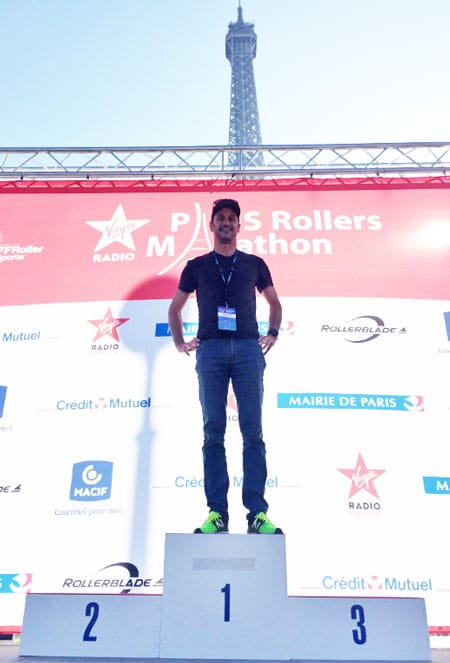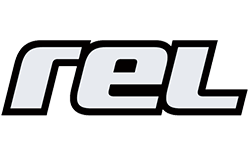Review of the first edition of the Paris Rollers Marathon with the organizer Tony Mogis
The REL team met Tony Mogis, the organizer of the Paris Rollers Marathon 2017 and creator of the 24-hour Le Mans race, to capture his first impressions of this first edition.
Par Aurélien GACHET
Interview
Hello Tony and first of all thank you for answering our questions. The first edition of the Paris Rollers Marathon took place a few weeks ago. What is your first conclusion?
 Hello. The balance is positive overall. For almost 20 years organizations have been trying to organize such an event in Paris. Unfortunately, so far, all candidates have failed in terms of administrative and security effort.
Hello. The balance is positive overall. For almost 20 years organizations have been trying to organize such an event in Paris. Unfortunately, so far, all candidates have failed in terms of administrative and security effort.
In fact, blocking roads over 42k in Paris without cobblestones is almost impossible. In Paris you will find cobblestones everywhere. In the course we chose, there were only 648m of cobblestones, but even this short distance is a difficulty for the skaters.
But we did it and we are very proud of it. The event is now a fixed in the calendar of events in the city and we can take a more relaxed look at the future of the Paris Rollers Marathon. On the part of participation and media attention, we are very satisfied. For 2018 we want to make small improvements and changes.
Are you satisfied with the number of registered skaters?
A total of 2,850 skaters were registered for the race. This is excellent for a first edition! We are at a time when alternative means of road transport are becoming increasingly important. However, inline skating is getting more and more competition from scooters and e-bikes.
Inline Skating has come a bit out of fashion in Paris and now has to establish itself again. In summary: 2850 skaters are very good for the first time.
As a reminder, the first edition of 24 Hours Le Mans was attended by only 600 skaters…
If we look at the registered skaters, it is noticeable that there were mainly French skaters. Do you want to recruit more skaters from abroad in the future?
Of course. Paris is a tourist city that attracts many foreigners. My ideas are weekend packages with accommodation, trips on the Eiffel Tower, the Louvre, Disneyland and of course the participation in the Paris Roller Marathon.
But with a first edition, we can’t do everything right from the start. It has to be structured. Internally, you need to find the right team leaders. Thus, the recruitment of 450 volunteers did not take place overnight. It took us many months to find all the volunteers. You have to prepare the people. They are often people without real event experience, but full of good will and passion. We are very hopeful. We are open to welcome every volunteer to our great team.
Organizing a sporting event in Paris is not the same as organizing an event in the provinces. What are the differences?
Closing traffic in Paris can’t be compared to Le Mans, Dijon or any other provincial town. The consequences in terms of congestion and traffic difficulties are more important.
There are nearly 4000 events organized every year on public roads in Paris. We have no priority. Paris is in no way dependent on skate tourism.
What were the main difficulties in the organization?
Finding a good road course was the hardest. We have proposed dozens of possibilities to the authorities, but most of our proposals were rejected. A first edition should not be too demanding and expensive.
On top of that the city of Paris does not decide alone, but the Parisian prefecture also has a lot to say about the organization of the event.
For your information: the course, which was confirmed to us in July, was changed again in September and confirmed only 7 days before the event. You can imagine how this has affected our stress level. We’ve already thought about canceling the race and transferring the money back to the participants.
In the end, we had to make some compromises, which did not suit us 100%, but we had no other options 7 days before the event.
We then had to dismantle a mini football stadium, move 40 palm trees 15 meters, close restaurants, etc.
Initially, the event should take place in the morning. Fifteen days before the start of the race, the authorities decided to postpone the 17,000 runners in the Nike 10k run from October 1 to October 15 (the day of our event), forcing us to switch to the afternoon or change the date of the event.
So the afternoon was good too 😉
However, we had to warn all participants before changing the schedule. Some of us felt responsible for this last change… but we knew that the runners had priority.
So yes, we know that some small parts of the course were not ideal. On a sunny Sunday (25 ° C), nearly 10,000 Parisians walk along the Seine and are likely to cross the streets where the skaters are racing, even though the security forces tried to warn the people. That’s why about twenty skaters couldn’t finish their race and had to go on the pick-up van.
But in general the course was good. Our goal is to stay as close to the Eiffel Tower as this year.
For the rest we have 2 or 3 small things to improve (which should not be hard to change for the future)
For example:
• the trailer, which broke down and could not supply the number of toilets needed (it was necessary to contact a last-minute supplier; the previous day only 4 cabins were available)
• the cloakroom, which was far too big, so that the participants had difficulties finding their stuff
Nothing very serious. It was a first edition and these are never perfect. But the positive results of this first edition allow us a bright future for the Paris Rollers Marathon and future releases of better quality.
Critics should not forget all those things that worked very well. That’s almost everything else. That is not nothing. The organization has received many congratulatory messages.
Will the course be changed for the next edition?
Yes, of course. We will pass all this information on to the police and the city of Paris, and for the next event we will ensure that we can enjoy an even better course. It’s still magical…when we think of it.
How was the feedback from your partners?
Today all our partners are very happy with this first edition. We think they will keep their support for future editions. And we hope to find more sponsors and partners.
How do you rate the impact on the media?
Very good! Virgin Radio (several million listeners) wanted to accompany us since the beginning. Since then, several hundred news and programs have talked about inline skating this year.
In addition, media such as TF1, France 2, France 3, BFM and C News sent many pictures of the event.
The Paris Rollers Marathon is a pioneer for media coverage of the discipline.
Brands, shops and associations encourage us. We managed to attract attention, which is very important for inline skating.
What is the institutional feedback?
We did not have a meeting with the governors yet. As for the city of Paris, the sports assistant was excited about the event and wanted the Paris Rollers Marathon to be an important event. The feedback is therefore quite positive.
And on a financial level, with the safety requirements of the authorities: could the organization get their expenses back?
If we count our own workload, NO. We spent several months working on this event and only had one week of vacation this summer. But that’s always the case with a first edition.
When you get involved in this kind of project, you have to know how patient you need to be.
What role did the French Federation of Roller Sports play in this event?
When we decided to get this project started, we asked Nicolas Belloir (FFRS president) to support us, especially in the sports organization.
He was immediately seduced by the idea of the event and its potential: an excellent stage for inline skating. In addition, it is also good for the French federation and its image.
The FFRS was therefore mainly involved in the sports and race management of the Paris Rollers Marathon.
Also Hervé Lallement and Arnaud Gicquel were very present and competent.
I wish they would continue working with us.
In addition, Nicolas Belloir used his political contacts (he is also Vice President of the CNOSF). I thank him for that.
And 2018?
First, we have to get an official date and work on the new road course. Then we will try to communicate more internationally, as Paris is a tourist magnet. In addition, the Skater Village should grow bigger…
Thanks Tony! We wish you good luck and see you 2018 for the second edition!
Links
Photo gallery of Sylvie Geoffroy and photo gallery of David Michel on mediaskates.com
